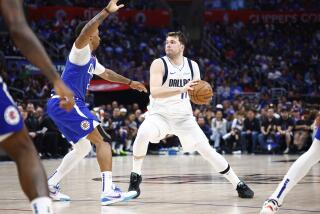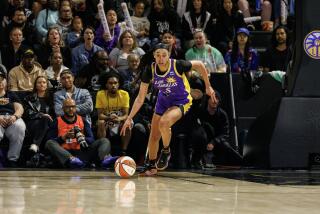Big Battle Looming for NBA : Pro basketball: If the players’ union goes by the wayside, so too might the 1995-96 season.
- Share via
NEW YORK — An epic battle is shaping up in the NBA, bigger than those between Hakeem Olajuwon and Shaquille O’Neal during last season’s championship series, and the fate of the 1995-96 season could hang in the balance.
The war being waged is whether the National Basketball Players Assn. should decertify or agree to sign a new six-year contract with the NBA.
A new collective bargaining agreement would ensure the 1995-96 NBA season would start on time. A decertified union would throw the league’s labor situation into chaos.
“The owners are telling the players ‘keep your union,’ ” said Jeffrey Kessler, the attorney representing the group of players trying to break up the union. “In the history of organized labor has there ever been a situation in which the employers have taken the position that their employees must be unionized?”
An antitrust suit is already filed in federal court in Minneapolis that could prohibit the NBA from implementing a salary cap if the union is disbanded.
NBA Commissioner David Stern, who says the season will start on time if the most-recent contract proposal is ratified, insists the league will not negotiate with any party other than the union.
“We’ve gone the last mile here,” Stern said. “This is an attempt by a particular group to kidnap the negotiating process.”
Kessler’s group, headlined by superstars Michael Jordan and Patrick Ewing, claim they have more than 200 players ready to vote to disband the union in elections on Aug. 30 and Sept. 7.
The ratification vote on the new contract also will be held at that time. Players will either vote for the agreement or for the dissolution of the union.
About 420 players will be eligible to vote, and a simple majority of those voting could disband the union.
Results are expected by Sept. 12.
“Because of the danger of not having a season, should we accept any deal that (Stern) proposes?” asked Jordan, who three times was handed the NBA Championship trophy from Stern.
“All he has to do is evaluate the deal that he’s proposed to us from a player’s standpoint. He wouldn’t accept that deal. There’s no way we should accept that deal.”
The biggest question being asked by the dissident group is: What was wrong with the old agreement? That pact expired at the end of the 1993-94 season and was kept in place last season.
“I’ve been in the league seven years and for those seven years it seems as if everyone from the players to the owners have prospered from the previous agreement, and from that agreement to this proposed new agreement it seems we’re giving a lot of things back,” said Orlando Magic guard Brian Shaw.
“Why should we not at least start from that point?”
The dissident group points to the four expansion franchises that entered the league from 1988-89, each paying an expansion fee of $32.5 million. The Toronto Raptors and Vancouver Grizzlies will enter the league next season after paying a fee of $125 million each.
The most-recent proposal would increase each team’s player salary cap from $23 million to $32 million in the contract’s sixth and final year, with the players being given a split of all sources of the league’s revenue, including luxury suites, arena signs, concessions and parking.
A rookie salary scale would be implemented, where rookies would sign three-year contracts and become unrestricted free agents after the pacts expire.
Kessler’s group says the agreement eliminates too many loopholes in the salary cap, which could limit teams’ ability to sign free agents, particularly those marginal players who don’t make millions.
“Free agency becomes worthless, because if there are no exceptions in the cap, then no one can give you an offer,” Kessler said. “If a team knows that no other team has money for you, and the only team you can turn to is your old team, than you’re not engaged in bargaining, you’re engaged in begging and have to rely on the kindness of the owners.”
The Larry Bird Exception, which allows teams to re-sign their own players without regard to the salary cap, will now be open only to players who are on a team for three years, or rookies after two years.
The exception that allowed teams to replace retired players at 50 percent of their salary without being affected by the cap was also cut out.
Stern downplays concerns over the free agency movement and says four loopholes to the salary cap will remain, allowing teams to re-sign veterans, and sign rookies, injury replacements and free agents using a $1 million reserve.
He says some $90 million will be available this season for teams to sign their own players or other teams.
Stern said the league pushed to close the loopholes that allowed players to renegotiate their contracts with balloon payments, or let free agents to sign contracts at a lesser value that could be voided after one year, enabling the player to re-sign with their new team under the Larry Bird Exception at a much higher rate.
“The cap was sort of riddled with some Mickey Mouse loopholes that made us a laughingstock. We addressed some of those loopholes, but in order to do that we stepped up and made some very substantial promises to our players,” he says.
The future of how the NBA conducts business now goes to a vote.
Kessler said he has not heard of any players who are defecting from his faction’s side.
Stern said he feels “quite optimistic” that the league will be victorious and the union will remain intact.
If he is wrong, NBA basketball could be a long way off.
“I hate to be a predictor of doom,” he says, “but unless we can negotiate a collective bargaining agreement, and now we’ve tried twice, the lockout will continue.”
More to Read
Go beyond the scoreboard
Get the latest on L.A.'s teams in the daily Sports Report newsletter.
You may occasionally receive promotional content from the Los Angeles Times.










